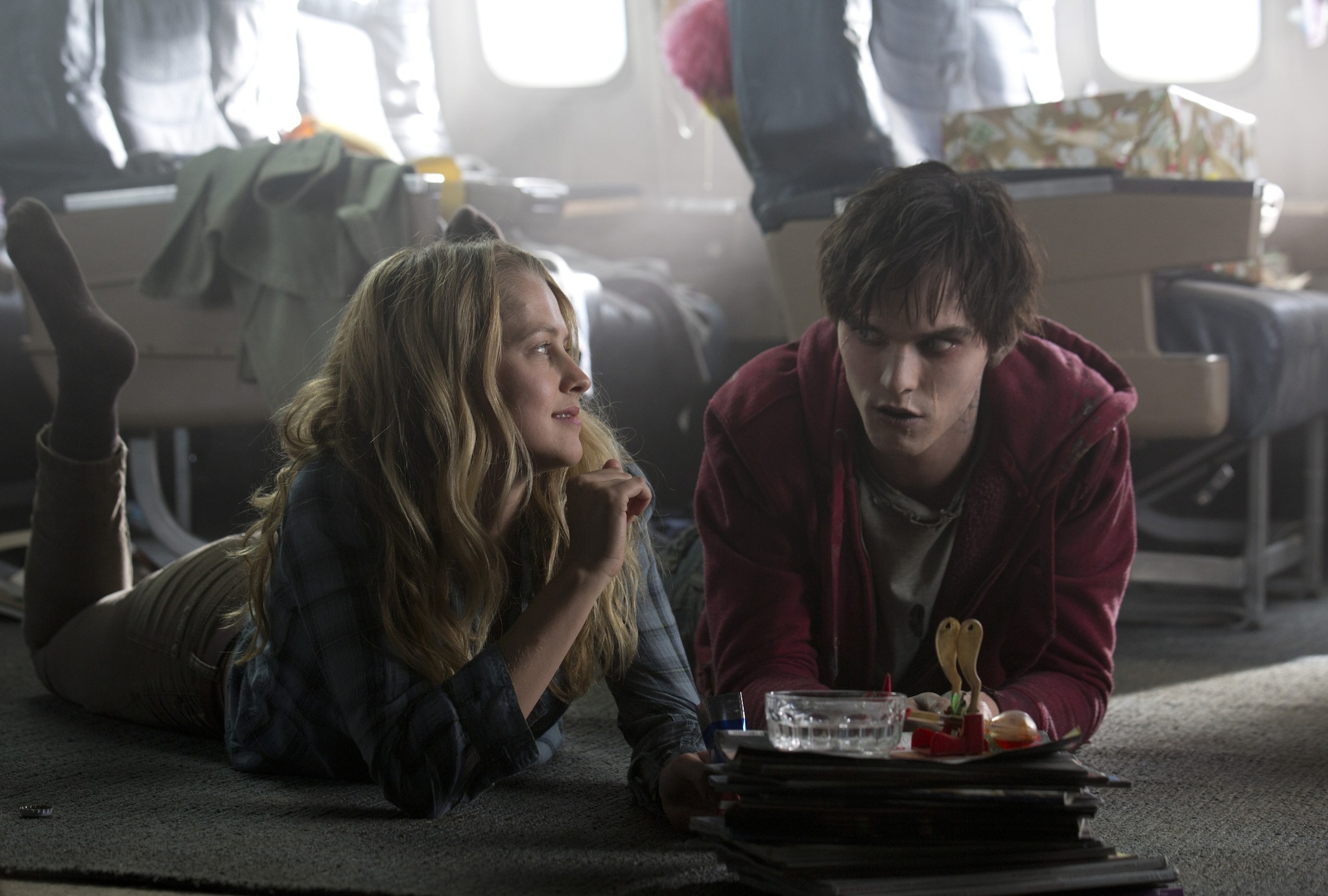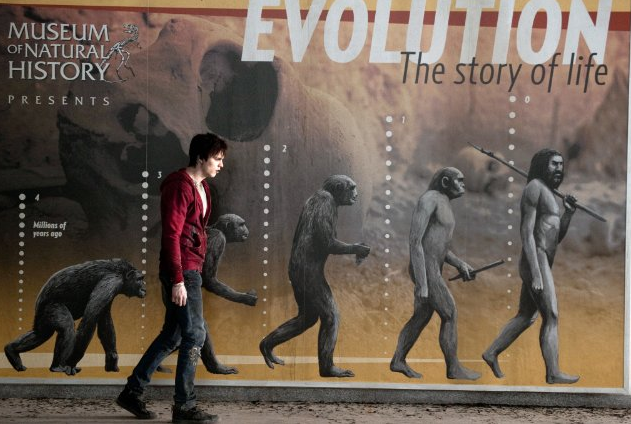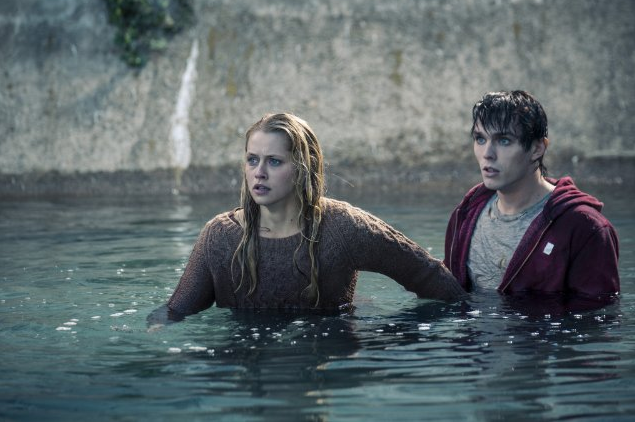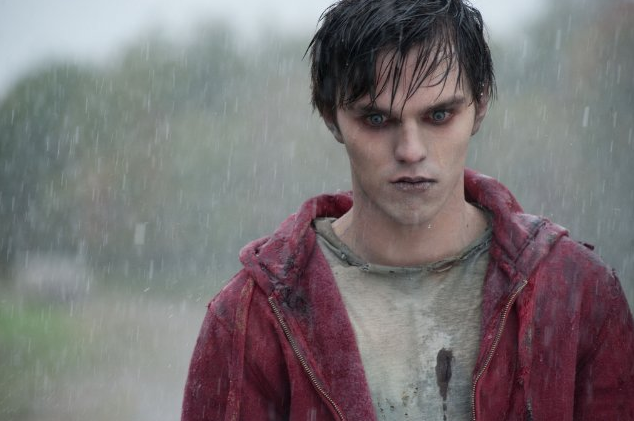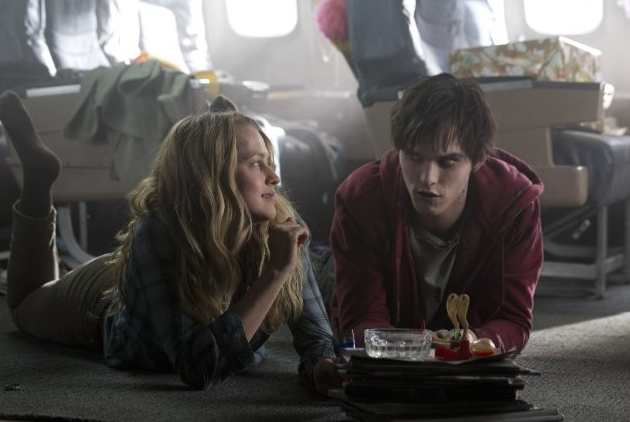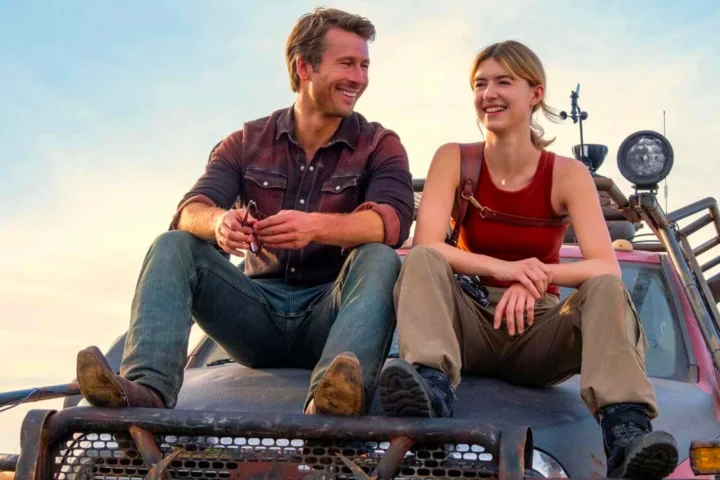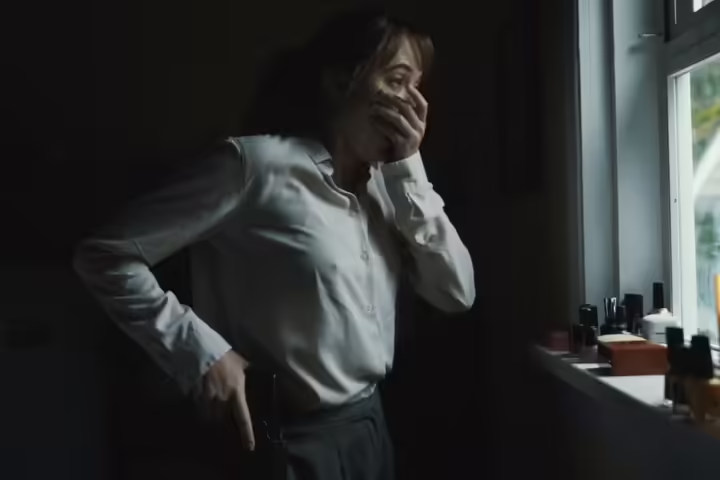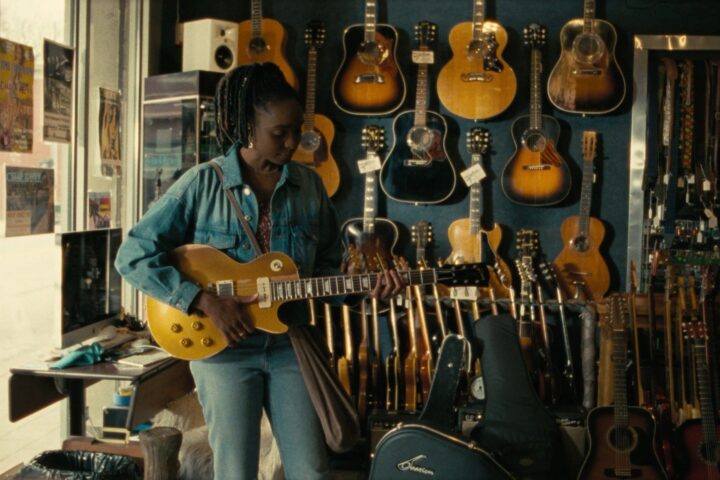January isn’t known for good movies, but Warm Bodies, the immensely appealing romantic comedy about a post-apocalypse where a melancholy zombie named “R” falls in love with a human girl named Julie, both lonely and looking for connection in isolated worlds, is a real treat. Directed by Jonathan Levine (The Wackness, 50/50) and starring a pair of beautiful, good actors—Nicholas Hoult and Teresa Palmer as a latter day Romeo and Juliet—Warm Bodies eschews genre tropes, sweetly suggesting that the spoils of the world will be healed by love and kindness.
I caught up with Hoult and Palmer recently to chat about the picture’s unlikely couple, and their thoughts on the film’s themes of dislocation and connection in an isolated world. To say the handsome couple is engaging would be an understatement, sharing the same natural flow in person that makes them so likable in the film, 2013’s nicest new surprise.
This movie really surprised me in that it uses a familiar genre to do some different things, and turns out to be a character movie. It actually says that we live in a cynical and detached time and have issues connecting with people.
Nicholas Hoult: I think that hits the nail on the head. The technology we have nowadays in fantastic to keep in touch, but then there is also an overuse where it becomes detaching from the world around us and we don’t stop and smell the roses because we are too absorbed in email or texting or updating statuses. So I think that’s a nice little message in there.
Teresa Palmer: Yes. To me it’s a movie so much more than the rom-zom-com. It really has these beautiful and underlying messages about how we need to learn to connect again and be present and go on these technology cleanses and throw your phones away. How many times are you with friends and everyone has a phone on the table and is texting and on Twitter and Facebook? There’s something tragic about that.
Right. No one sends birthday cards anymore. Everything is wall postings on Facebook.
NH: Yes, I had a birthday recently and didn’t get that many physical cards, which disappointed me.
TP: It is all e-invites now and even, for instance, photographs- I go and look at my albums on the computer and don’t print out pictures anymore and have them in my hands. There is something sad about that.
How do we course correct that kind of stuff?
TP: I think the first step is just being conscious of it. I know when I am conscious of the fact that I am over-texting, on email and just not being present and having real human connections, I stop and put it away. Sometimes I even print out my photos because I feel like connecting back to that thing that we once had.
NH: I think I want to start a new thing where it’s like a charity no phone day, where for one day everyone has to shut off their phones and just go through life without them.
TP: That would be really good!
NH: It would be a disaster though, wouldn’t it? People would be all over the place. It would never last. People would be in trouble.
TP: Or everyone picks his or her own day. It doesn’t have to be the same day. Just like for one day, “I am doing this.”
NH: You told me the other day that when you go out to dinner you all put your phones in the center of the table and the first person who picks up the phone has to pick up the tab.
TP: I know! It’s hilarious because everyone tries to make excuses, like, “Well, Joe has to pick me up from dinner so I have to answer!” And it’s like, “Well, that’s fine, but you can pay for dinner.” It’s quite funny. Yeah. So just being conscious of the issue and as soon as you know it is an issue you can start to do the things to fix things.
NH: But this isn’t a preachy film though!
TP: Yeah! It is an underlying message. It is not preachy or overtly in your face saying, “We need to change.” It’s more hidden nods to things that we could potentially get better at.
Let’s talk about the love story and the metaphor for the tentative way that people fall in love—the push/pull, being uncomfortable at the beginning and then gradually getting closer.
TP: Yeah. Isn’t it that all good things start…scary?
NH: All good things start a bit scary.
It’s treated nicely in the film and not as a joke.
NH: That has to do with Jonathan Levine and the script he adapted. He developed the characters and gave you time to like them, but it’s funny, lighthearted and doesn’t take itself too seriously but never becomes a parody. The relationship starts as most classic ones do—eating the old boyfriend’s brains. But then they can’t communicate, and he feels like most guys when around a beautiful woman. You suddenly panic and can’t communicate. But then it’s nice because humanity has given up hope and Julie finds this one person who can still create a spark inside of her. And they both kind of help each other out of a rut.
TP: It’s really nice. They really bring life back into each other and she helps him heal just as much as he helps her heal. That is what is so beautiful about it. So many relationships are that way. You do need to help each other and do need to reignite passion in each other. I just find it all so romantic! (laughs)
For me, the most special part of the film is where it takes us by the end, when it suggests that the way to heal the world and unite people is just love.
TP: Through love! That is my favorite message of this movie!
NH: As The Beatles said, “All you need is love.”
TP: All you need is love! And it’s very important in life and we forget it as we become desensitized after growing up and facing trials and tribulations of life. When I connect back to the source—love—I know that I always feel infinitely happier. And all my problems seem so much smaller. And I start to float again. The world is a brighter shade. I love that.
The film also is a bit bittersweet about nostalgia, especially in the whole sequence where you are in the airplane together. There are great 80s film and music references. Woody Allen recently suggested it was an artificial construct; that every generation is nostalgic for the one before it. What about you guys? What are your touch points? What makes you nostalgic?
NH: Pokemon cards. (laughter)
TP: Pokemon cards!
NH: I loved those so much.
TP: I get really nostalgic when I go back to Adelaide and just walk around the suburb where I grew up, seeing my school. I used to live in the same area. Just remembering what it was like to be at high school. Playing marbles at recess and all the fun, little things that I would do. It was very outdoorsy. I get nostalgic when I am home. It is bittersweet, because you are not there and everything has changed and moved on. A lot of my friends are married with kids now, and I am just not of that world anymore. It feels so happy and I love living in that, but it’s sad too.
NH: I get nostalgic on the set actually, running around and pretending to be fighting or being dead or whatever it might be—that is what I did as a kid and it makes me feel like a kid again.
TP: That is so nice.
I really appreciated the brain eating idea in the film. It’s funny, but when you think about it actually it’s the ultimate act of empathy. If you could appropriate another person’s memories, whom would you choose?
TP: I am not going to go famous. I am actually going to say my nana. She had a remarkable life and raised eight children and they came over on a ship from England, and she would always talk about how incredible that time was in her life; how happy she was. It is really beautiful and I would love to go back as I am so similar to her.
You mentioned her on your website, yourzenlife.com.
TP: Yes!
NH: Everyone is talking about this website! I have to check it out.
TP: Yes, you have to look at it. It is all about happiness and love and being your best self, and then trying to be impactful along the way. But yes, I talk about her a lot because I am very much like her. So I would love to go into her memories and see what that was like and what my mom was like as a little girl. That would be nice.
NH: Howard Hughes. I would like to see a bit of his life. He was an interesting guy.
TP: That would be really interesting. Wasn’t he with Ava Gardner for a second? That’s from The Aviator! (laughs)
NH: So Howard Hughes or one of my family members from a generation two or three times before me just to see exactly what was going on and how it all came about.
Nicholas, can you talk for a moment about the physical part of your performance? The audience is treated to your narration, but it must have been a challenge to play the role without that, mainly just using your face and unable to use all that many emotions.
TP: He does such a good job.
NH: I liked that! When I read it I knew it would be tricky to make it work. The main thing about the character was not being able to communicate though wanting to and trying his best. And then there is always the part about focusing on the other actor in the scene then that kind of works. And Teresa and everyone else were really good, so it made my job kind of easy. You could just watch and enjoy what they were doing and react to that.
Teresa, the comic moments between yourself and Analeigh Tipton are very funny, particularly the makeover scene.
TP: Oh, Analeigh! She is an incredible, gifted actress. She is perfectly quirky and she injects a beautiful humor into this film; she and Rob Corddry, especially. I loved working with her because she loved to throw in unscripted humor and play around, and she was very open to trying new things and she just plays that role perfectly. And she is also a really cool person to hang out with outside of work too, so that was nice!
What is the best part about your jobs?
TP: Being a gypsy. There are downsides to that, but I love that it is always changing and new and we are in different places, playing different characters, meeting new people and it’s just constantly stimulating because of the change.
NH: It’s fun. You always learn. You travel. You meet great people. I mean it’s ridiculous that you get paid for doing it, really.
TP: Yeah! And to learn all of these new skills on different films. It’s also a great way to self-express and it’s therapeutic.
NH: It’s definitely therapeutic.
TP: It is, isn’t it? And then I love that we have so much down time too. You can go and shoot a film for three months of the year and then be okay to take the rest of the year off because you get paid for three months of intense work and then you can spend the rest of the time doing things you are really passionate about, like yourzenlife.com or writing. I love that aspect to it—the freedom, I guess.
When you think about some of the “bigger” films that you have done like I am Number Four or X Men, for example, is it an objective to work in that world? Or is it perhaps a career necessity to do tent pole movies in order to do tinier films like A Single Man, or even this one?
TP: I think for me, I started doing tiny films and then I guess an American agent saw that and I was brought to America and put in The Sorcerer’s Apprentice, which was a $150 million budget movie! It was a surreal experience for me. At the time I wasn’t making any choices with my career, I was just getting the roles that I was getting and trying to be my best in them. Now I am a bit more conscious of balancing studio films that I feel connected to with smaller, character pieces and independents. For me it is always about wanting to work with directors or actors I am inspired by. It’s about getting beneath a challenging character now.
NH: Certainly those films have to be done because they help you to get the smaller films made. I enjoy them and they are fun. You go in there and they are big and spectacular and lots of people. There are always people you like working with and can learn from, and it’s good to be able to mix it up and balance the bigger and smaller stuff. Even doing theater occasionally.
TP: Just to push the boundaries and keep you learning.
NH: Yeah, to keep you on your toes a bit.
Nicholas, what are your thoughts on working with Tom Ford in A Single Man?
NH: Oh, it was fantastic! I am very proud of it. I auditioned and couple days later got a phone call saying to be on a plane the next morning. It was a great experience and fast shoot—only twenty-one days, I think. Tom was a fantastic director and cared so much about the project and was very nuanced and felt everything he was trying to explain. The character would feel it too. Colin (Firth) is a great actor to work with; he is very relaxed. It was easy in some ways. He is a stand up guy whom I look up to and the scenes were very easy to work with him.
The directorial style in that film is so exacting, isn’t it?
NH: Yes, the attention to detail and aesthetic is phenomenal.
Getting back to Warm Bodies, is true love a sort of “one person for only one other person” type of thing?
TP: I personally believe you have lots of “soul mates.” I don’t know if there is one true love. I don’t like to think there is, because what are your chances of finding that one true love? The romantic in me likes that, but the realist in me thinks that you can fall head over heels in love with lots of different people on your life journey.
NH: Yes. (laughs) I kind of believe the same thing, but then I think perhaps theoretically that does not make sense. It’s tricky and under circumstances and timing.
TP: You learn from each person. Love is a really beautiful thing like that. It’s a very different time these days than back when my nana was with the one love of fifty years.
NH: But don’t you think that concept has gone away with time? My parents have been married over thirty-seven years now and I feel as though it was that way with the generation just after the second World War. They all got married and had kids young, and then there was a rebellion against that in the 60s and 70s…
TP: Free love!
NH: Free love! We don’t need to get married! I feel slightly like the generation coming up could revert back.
And the divorce rate in America is over fifty percent.
TP: Yes over fifty percent.
NH: It is?! That is so sad.
TP: It’s so disheartening. Yeah. (long pause and then laughter) Well, that ends on a good note!
